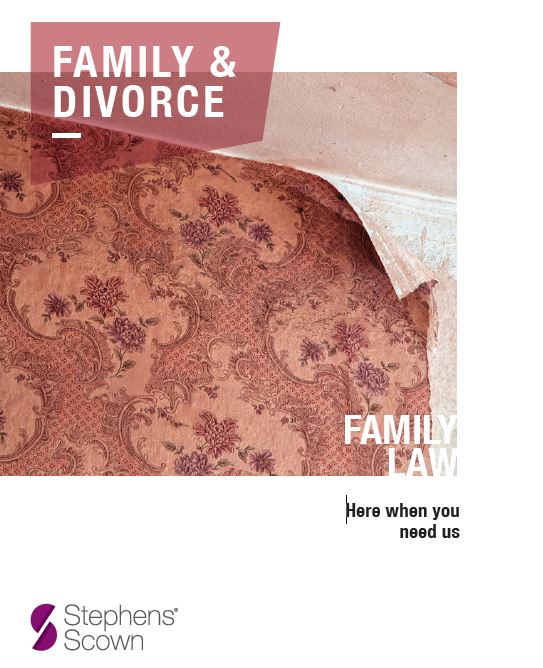Business Assets in Divorce
For those who have business assets in divorce proceedings, the uncertainty of the process adds an extra layer of stress: the inability to plan ahead for the business as well as having your personal life in limbo.
It is especially important for business owners to take early advice and ensure they are informed on the effect the divorce could have on their business, the tax implications and the options to navigate the divorce process as swiftly and efficiently as possible so they can refocus on progressing the business.
What happens to a business during divorce?
The first step in the financial process alongside a divorce is to exchange financial information, usually using Form E. This involves providing information and documents about business interests. Sole traders and partners in a partnership need to disclose their business bank accounts, trading accounts (if produced) and tax returns. Directors and shareholders in limited companies need to provide company accounts, any management accounts available since the year end or any other significant updates, director’s loan account records and their tax returns.
Any business assets (for example property) will need to be formally valued where values cannot be agreed between the couple. That is likely to involve providing more documentation to a jointly instructed expert who is asked to value the business interests and advise on liquidity ( the prospect of drawing any cash out of the business) and the tax that would be payable on a sale.
Not all business interests have a capital value over and above the income the business generates. Therefore, in those circumstances you would count either its capital value or the income derived from the business, but not both.
The court will factor in the value of business assets in divorce as part of the total pot and can discount the value of shareholdings to reflect the ongoing risk and future work associated with that value.
If the business is wholly owned by one or both of the couple and there are no third parties involved, the court can either keep/transfer the business into one party’s name as part of their share of the overall pot, or one party might buy out the other’s interest. This can happen in one lump sum (if affordable without damaging the viability of the business) or can be achieved with staged payments.
Where there are third parties involved, including business partners and staff, the court is alive to that and where possible would want to avoid making orders which may adversely affect people unconnected with the divorce process. Sometimes third parties who are affected may be joined into the divorce proceedings if it is necessary for them to voice their position before the court decides the financial outcome in the divorce. It is essential for them to take independent advice from a solicitor specialising in the treatment of business assets in divorce.

Valuing a business
The valuation of business assets in divorce is complicated, so we often work with independent specialist valuers and accountants to ensure the figures are accurate and the nature of the particular business is taken into account. Where business assets are significant, we will take independent “shadow” advice from a specialist accountant as well as jointly instructing a single joint expert (SJE) accountant with the other party’s lawyer to provide the valuation we then work with in the divorce. The shadow advisor will provide strategic advice on the instructions to the SJE and give us an early indication on the sort of value to expect.
For those who are sole traders or partners, the process tends to focus on the valuation of the business assets – property, machinery, livestock etc. A sole trader owns 100% of their business assets and we would need to calculate the partner’s appropriate shares of any valuation.
For those who own shares in a limited company, once any property or other assets owned by the company are valued, the SJE accountant is asked to place a value on the shareholding. If that is a minority shareholding then the accountant is asked to advise on the appropriate discount to apply. However, the question of whether to apply a minority discount is one for the court: it depends whether the shareholders act together (as they might in a family partnership) and whether there is any reasonable prospect of the shareholding being sold in isolation. It may be that no discount is appropriate.
Tax consequences of selling business assets are also factored in (even where assets are being retained) and CGT needs to be calculated and deducted from the value of all business interests.
Once the single joint expert has valued the business interests, both parties will have the opportunity to raise questions of the expert in a short window of time. Legal arguments can then take place about whether to discount the valuation of the SJE to take into account risk and future work that is assumed within the valuation.
There are several approaches to business valuations and combining expert legal and accountancy advice can have a significant impact on the legal outcome.
Can you sell a business during divorce?
There are many potential orders the court can make in relation to business assets (for example shares in a company or a personally owned business asset). The main ones are:
- Order the sale of business interests and a division of the sale proceeds.
- Transfer assets from one party to the other.
- Order payment of lump sum(s) from one party to the other in exchange for retaining a business asset.
However, it is very unusual for the court to order the sale of a business asset unless that is what the business owner wants. It is very much a last resort. The court is alive to the number of people who may depend on that business for a livelihood – any staff or business partners – and will not want to disrupt that unless there is no alternative. The business also generates income, which the court will want to preserve.
Normally, a value is placed on business assets (net of tax) which is then factored into the division of the couple’s overall assets. The level of risk associated with maintaining that business can be factored into the percentage division of the total pot.
We aim to negotiate a settlement that meets the needs of the business and if that can be achieved outside of the court process (as is often the case) we can be more creative and focus on tax-efficiency. Commonly we deal with settlements involving companies buying back a party’s shares so that they extract the value of their business asset as tax-efficiently as possible. The court could not order this and so tax-efficiency is often the driver behind people being prepared to negotiate away from court.
If one party needs time to buy out the other party’s interest in the value of a business they wish to retain, several lump sums may be paid over time. It would be usual for the income generated by the business to be shared with the spouse until they are fully bought out.

Inherited businesses
If your business existed before the marriage – or you or your spouse received it as a gift or inheritance – all or part of the business assets may be classed as ‘non-matrimonial property.’
Non-matrimonial property is the name given to any assets which are not the result of the couple’s effort during their marriage (including pre-marriage cohabitation). It can be ring-fenced as separate from the matrimonial assets, which are always shared on divorce. If the division of the matrimonial assets alone would meet both parties’ needs, non-matrimonial assets need not be shared.
As business assets change over time, it is not usually as simple as to say a business asset inherited or brought into a marriage by one party should be ring-fenced in its entirety. Business assets fluctuate in value and significant growth (or loss) could be achieved from the work done during a marriage with the support of a spouse or civil partner. Assets can also be mingled with matrimonial property such that it is difficult to assess the value of the original inheritance/gift.
Often, we therefore have to consider the extent to which a business asset should be treated as matrimonial and non-matrimonial and the court will apportion the valuation taking into account the facts of the case, including the length of the marriage. It is expensive to instruct accountants to try to place historic values on business assets (to determine the growth during a marriage) and the court now tends to take a more broad-brush approach.
How inherited businesses are dealt with in divorce proceedings will therefore depend on the level of other financial resources involved and what has happened to the business asset during the marriage.
Specialist advice from a lawyer who understands the approach to apportioning the value of business assets in divorce is essential.
Professional advice on business assets in divorce
Our expert Family Law team brings together the specialisms of our top-ranked Family Law team and the practical business acumen of our highly regarded corporate lawyers. This means you have access to our substantial experience advising clients through divorces that involve business assets.
We understand that for business owners, time is money and they need to get through the divorce process as swiftly and efficiently as possible to get their focus back on the business. Whilst that is not wholly in our control (as it depends on a constructive approach from the other party’s lawyer), where possible we use non-court dispute resolution methods to speed things up:
- Supporting clients through mediation so they benefit from legal advice during that process.
- Private FDRs – these are privately arranged negotiation hearings where a barrister is jointly selected to act as a judge for the day and give constructive feedback on both parties’ proposals for settlement to help focus negotiations and hopefully achieve a settlement.
- Arbitration – where a private FDR does not succeed, an alternative barrister or retired specialist judge can be appointed by both parties to determine the outcome for them.
- Resolution Together – this is our divorce advice service for couples where together they instruct one of our lawyers to provide neutral advice to help them reach an agreement. The lawyer still ensures all relevant information is gathered and expert valuations obtained but it cuts out the cost of correspondence between two lawyers and means both parties get all the same neutral advice at the same time.
If court proceedings are needed (which is sometimes the case if things are acrimonious or the parties each have very different views as to what the appropriate outcome should be) we are very experienced in dealing with contested cases involving business assets in divorce. We are ranked in the High Net Worth edition of Chambers & Partners, which reports: “Stephens Scown is a stalwart South West firm with leading family practices in both Devon and Cornwall. The team covers public and private children matters, wealth protection and financial remedies involving trusts and pensions. It is well known for its ability to represent clients in alternative dispute resolution proceedings, including mediation and collaborative law matters. The team has notable experience in handling highly sensitive cases concerning alleged domestic abuse, particularly on behalf of children.”
We have strong relationships with experts in valuing business assets and the tax consequences of dealing with business assets in divorce so can ensure the wider right team is in place to support you, whether you are the business owner yourself, or the spouse or civil partner who needs assistance to claim your fair share of the business asset value.

How can we help you
"*" indicates required fields
By pressing send and providing your details you are agreeing to our Privacy Notice.
Once you submit your enquiry we will forward to the correct legal team to get in touch as soon as possible.
Related Services
Downloads
Related Info Hubs
Team Leader







